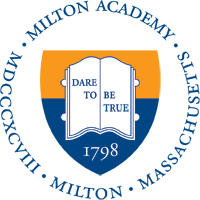Why Milton?
Being smart and interested is easy, fun and normal; everyone around you is motivated, too.
Learning is discussion-based, not lecture-based; intense conversation in the classroom makes the class exciting. You make connections and discoveries you never imagined.
Your teachers look for analysis, critical thinking, expressing ideas; they help you achieve these skills. You’ll develop your own point of view, and you’ll learn to respect others’ differing points of view.
You have your own advisor. One advisor counsels you and a small group of other students throughout your Milton years; guides your course selection; keeps in touch with your academic and social progress; is your family’s liaison to the School; and acts as your resource and advocate.
You’ll be prepared to take AP tests, even if the course is not labeled AP. In fact, many upper level courses are more challenging and rewarding than AP curricula.
Teachers are ready and willing to help you outside of class; students visit faculty in the dorms and call faculty at home for help.
Faculty get to know you well—who you are and what you care about; you’ll want to meet their high expectations of you.
Your courses are not limited to the texts; readings and discussions go beyond the textbooks, and teachers respond to what students are interested in.
Your art teachers are artists, in and outside of school; your music teachers are musicians; your English teachers are writers; your drama teachers are performers, set designers, and directors, and so forth. All your teachers are scholars in their fields, and they love to teach.
Everyone here works hard, but they have a lot of fun, too. Students will tell you that they and their friends are really happy, and that life here is collaborative, not competitive.
Our proximity to Boston is a unique and important feature to our School. Only eight miles away, the city offers so many opportunities for fun and for learning.
You won’t just become prepared for college—you’ll develop the skills that help you become prepared for life.
Your learning is more about process than outcomes, more about balance than stress. (For example, you’re only allowed a certain number of major assignments due each week.)
You can be involved in a lot of different activities here. Many students try something new that they’ve never done before, and that’s encouraged. Or, you can take the thing you love to the max.
You’re given a lot of unstructured time (increasingly so, as you get older), but you also have a lot of support. Your friends, the upperclassmen in your dorm, your peers, and your teachers want to help you.
We’re a big school, but with a small feel. Your classrooms have about 14 students in them. Everyone is part of the action.
Options are plentiful, and choices are important. Students run their lives and their days according to what they like to do. You’ll go to class, but then you’ll choose your afternoon activities, and spend that time the way you want to.

